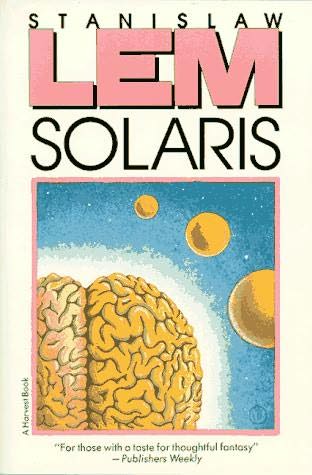 I love Solaris. I read it during my 2-day trip to Bangladesh. This Polish sci-fi novel takes place on a space station located above and dedicated to the study of the planet Solaris, which is covered with an "ocean" that appears to be a massive conscious entity. The scientists on the station find themselves being "studied" by the ocean -- but who can tell what the motives are of this particular alien? Perhaps it was taking revenge on them for using high levels of energy to test it, or perhaps it was mindlessly pulling out their repressed memories for no reason whatsoever. The point is that it's an alien, and we can't understand it, and we don't even understand ourselves.
I love Solaris. I read it during my 2-day trip to Bangladesh. This Polish sci-fi novel takes place on a space station located above and dedicated to the study of the planet Solaris, which is covered with an "ocean" that appears to be a massive conscious entity. The scientists on the station find themselves being "studied" by the ocean -- but who can tell what the motives are of this particular alien? Perhaps it was taking revenge on them for using high levels of energy to test it, or perhaps it was mindlessly pulling out their repressed memories for no reason whatsoever. The point is that it's an alien, and we can't understand it, and we don't even understand ourselves.Lem points out that people don't go out into space to look for aliens; we venture into space to look for mirrors, for ourselves. This novel was written in the sixties, and so at the very start of the space age Lem captured the theme of human self-preoccupation.
The other thing amazing about this novel is the absolutely fantastical depictions of the constructs that the ocean creates, and the designations that pioneering scientists have made for the observable ones. On this note, Lem also describes the infighting among scientific circles almost along religious lines, like schisms forming among churches. There would be leaders who would define a certain school of thought, which would be published, and then others would come and prove it wrong, and there would be another school of thought, and so on.
The main plot centers on the psychologist, Kelvin, whose dead-by-suicide ex-lover appears to him on the space station. [SPOILER ALERT] He eventually comes to understand that this construct is not the original, but he loves her anyway, despite her inhuman tendencies (superhuman strength, physical inability to remain apart from him, and almost limitless regenerative capabilities). I found her sympathetic as a character because she cares for him, but then she was specifically made to, and she realizes this and is horrified by it. She also reacts to his horror at her existence, and in the end [MAJOR SPOILER ALERT] works with another scientist to end her pseudo-life. Or is it actual life? After all, she was developing a personality...
As a final point in my review -- the author mentions the incredible amount of data and raw material accumulated throughout the years of studying the ocean, and still its nature and purpose remain unclear. Just like us. So in the end, we will always find a mirror in space.
Btw - here is what Lem has to say about his own novel, as a reaction to the latest film version (from Hollywood): http://english.lem.pl/index.php/arround-lem/adaptations/soderbergh/147-the-solaris-station
No comments:
Post a Comment